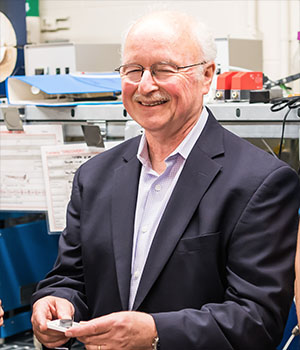
Harry Tuller
(he/him)
Materials Science and Engineering
Encouraging and energizing
Consciously aware of what each of his students needs, Professor Harry Tuller’s mentorship style is encouraging and energizing. As one student notes, he is “an amazingly kind and curious man, who is willing to help anyone who shows up and tries.”
Harry Tuller is the R. P. Simmons Professor of Ceramics and Electronic Materials in the Department of Materials Science and Director of the Crystal Physics and Electroceramics Laboratory at MIT. Currently, his research emphasizes the modeling, processing, characterization, and optimization of energy-related devices (sensors, batteries, fuel cells, solar/photolysis cells) and the integration of sensor, actuator, and photonic materials into microelectromechanical (MEMS) systems. His research has been extensively published in over 485 articles, 15 co-edited books, and 33 patents.
Keeping spirits lifted
When Tuller notices that a student is losing enthusiasm for their work, he reaches out to set up a meeting (a Mentoring Guidepost identified by the C2C program). If a student seems to be struggling, Tuller says, “I initially offer advice and support, suggest a break in activities, and if it becomes more serious, I encourage them to see a health care professional.”
When one of his students had to take a break from school because they found themselves anxious and depressed, Tuller provided the necessary support for the student to get help, and then later to successfully transition back into work.“[Tuller] met with me on multiple occasions to help me parse through my own anxieties and concerns with anecdotes from himself and his past students.”
Every student responds to challenges and rewards differently, Tuller says, so it is important to provide personalized advising. Learning what types of stressors affect each student can go a long way in alleviating anxiety-provoking situations for students and in helping students manage their own stress. One student, for example, expressed discomfort about a collaboration between research groups. According to the student, Tuller responded and worked to ensure the collaboration occurred in “a smooth and stress-free fashion.”
Tuller actively demonstrates to students that he cares about their well-being and professional development. Key to long term success, one student says that Tuller “has always encouraged, supported, and enhanced my excitement for my research… all the while being very understanding with the fact that I still have a lot to learn theoretically and practically.”
Supporting the long haul
Students say that Tuller encourages and supports them to attend important conferences without always expecting them to give a talk or present a poster. Regarding one such occasion, a student recalls, “It was an incredibly fruitful experience on a professional level because it was the first time I attended a full conference.”
Tuller says that many graduate students struggle to retain focus for the long haul of a 5-6 year PhD program, especially during the second half when time is less structured. Tuller suggests that in order to thrive, “students need to focus on achieving goals to the best of their ability” and not worry about competing with their colleagues. He advises students to focus on addressing difficult scientific and engineering problems and navigating apparent dead ends. In order to keep moving forward, Tuller tells students to “communicate their research goals clearly and convincingly and to be open to constructive criticism.”
He tries not to micromanage his students’ research or how they spend their time. Nevertheless, Tuller says, “I feel it is important to meet with my group members individually and regularly—typically on a weekly or biweekly basis, depending on how they best thrive.” Tuller’s consistent contact and tailored student support has contributed to his students’ resounding success.
